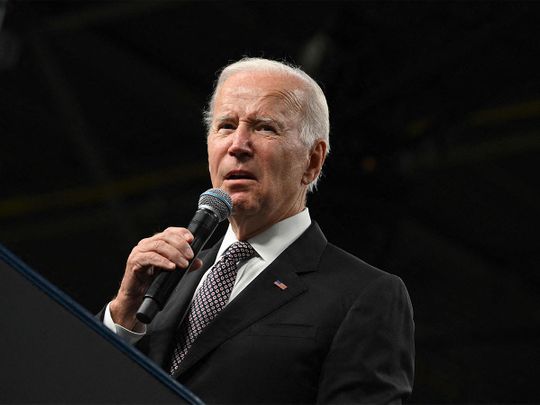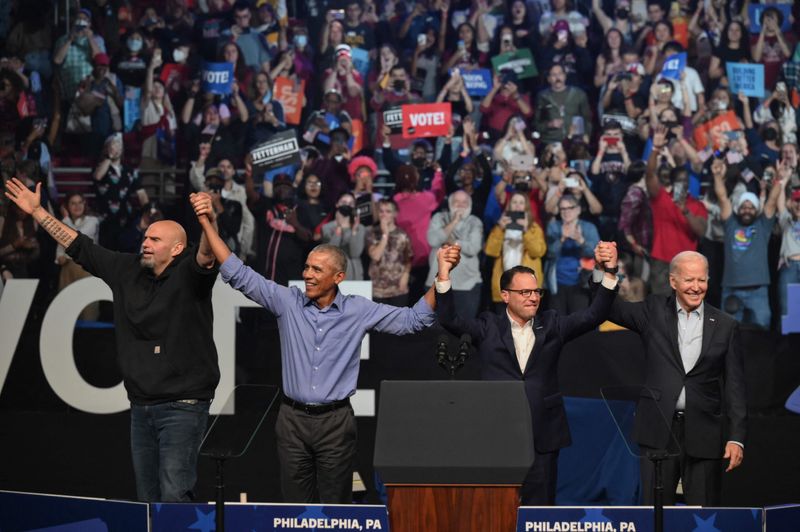
US President Joe Biden, who delivered a speech recently on the perils faced by American democracy, might want to keep in mind Senator Gerald Nye of North Dakota.
On Dec. 7, 1941, Nye was at a rally for America First, the isolationist, fascist-friendly movement that claimed aviator Charles Lindbergh as its most prominent spokesman. America First, like Lindbergh, was openly racist and anti-Semitic. (Lindbergh worried that war in Europe might weaken defences against the “Asiatic hordes” and “destroy the treasures of the white race.”)
Still, when a reporter informed Nye of the attack on Pearl Harbor, he did not unleash a tirade of racial aggression against the Asian foe that had launched the “sneak attack.” Another enemy was foremost in his mind.
“It sounds terribly fishy to me,” Nye said. Later, after gathering his thoughts, Nye focused on the real culprit: President Franklin Roosevelt, he said, had “manoeuvred” the nation into war.
Biden’s speech on democracy was a tacit recognition that Nye, who died in 1971, is alive and well and currently petitioning your local board of elections about voting irregularities that he read about on the internet.
One benefit of Biden’s office is that the line between a partisan and a presidential speech can be very narrow. Much of Biden’s democracy speech was tactically partisan. The first 13 minutes or so constituted a mostly pedestrian get-out-the-vote exhortation in the guise of something more momentous. The final eight minutes or so tapped Biden’s natural American passion. He was visibly pleading democracy’s case.

Threat to American democracy
Many Democrats, along with Never-Trump Republicans who have become Never-MAGA Republicans, recognise MAGA as an increasingly illiberal political movement that poses a grave threat to American democracy. Biden cited the most obvious example — the large number of MAGA candidates for high political office who refuse, Donald-Trump-like, to accept election results that don’t please them. It’s scary stuff. The Republican nominee for governor of Wisconsin has suggested that if he wins office, Republicans will never lose it.
“In our bones, we know democracy is at risk,” Biden said. “You can’t love your country only when you win.”
That’s a solid democratic sentiment. But just as Nye and others discounted the fascist threat in the 1930s, the crisis of democracy is a marginal issue in the 2022 midterms. Which is another way of saying that the lack of urgency is itself a kind of crisis.
MAGA’s version of America First
Roughly one-third of the country has sworn itself over to MAGA’s version of America First. Another third seems unconcerned by, and perhaps oblivious to, the threat posed by election deniers, conspiracy theorists and that constant companion of post-2008 conservatism, rage. Meanwhile, the part of Biden’s own coalition that senses the proximity of danger is also the part that votes rain, shine or autocracy. They don’t need a motivational speech.
A headline in the New York Times last week captured Biden’s dilemma, and democracy’s, pretty neatly: “Voters See Democracy in Peril, but Saving it Isn’t a Priority.” Predictably, there was no agreement about the meaning of either democracy or peril. “Most Republicans said the dangers included President Biden, the mainstream media, the federal government and voting by mail.” That covers practically everyone but the people who tried to overthrow the republic on Jan. 6.

Biden cannot move such people, and knows better than to try. But as Republican politicians begin building the machinery, such as the independent legislature theory, to move the levers of power further from the populace and closer to themselves, it’s a useful tonic to remember how fervently Roosevelt’s efforts to defend Europe against fascism were opposed by many of his fellow Americans.
In the end, history intervened at Pearl Harbor; America First was overrun. It was a brutal, cataclysmic way to learn the price of democratic failure. But Roosevelt’s prior speeches, pointing out the rising danger, hadn’t worked.
Biden’s almost certainly won’t, either. Like Roosevelt, however, Biden knows the speeches must be made. History turns. When it does, the ground must be ploughed.
Bloomberg
Francis Wilkinson is a noted columnist covering US politics and policy










